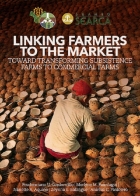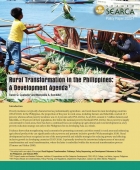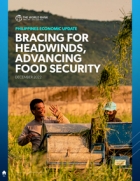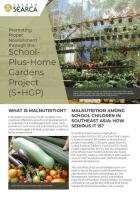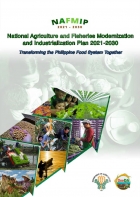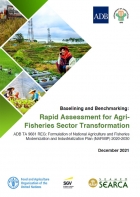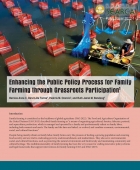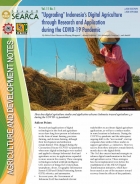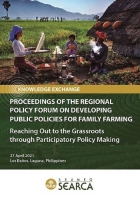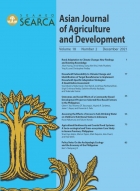SEARCA Publications
Linking Farmers to the Market: Toward Transforming Subsistence Farms to Commercial Farms
Prudencio U. Gordoncillo, Merlyne M. Paunlagui, Nanette A. Aquino, Zeynna E. Balangue, and Anieluz C. Pastolero
The Philippines is rich in natural resources such as fertile lands. However, the economic surplus generated from the use of land as the main productive agricultural resource has been sub-optimal. A key strategy is to link farmers to the market. This requires a systematic scanning of the state-of-the-art in commercial agriculture, benchmarking the farm-market linkage, and documenting best practices in domestic farm-market linkages as well as assessing market linkage interventions done in the…
2022Monographs
Rural Transformation in the Philippines: A Development Agenda
Karen Q. Custodio and Mercedita A. Sombilla
Poverty incidence is typically characterized as predominantly agriculture- and rural-based in most developing countries (IFAD 2018). In the Philippines, the proportion of the poor in rural areas, including farmers and fisherfolk, reached 25.7 percent, whereas urban poverty incidence was 11.6 percent only (PSA 2023a). As of 2021, around 2.7 million farmers and fisherfolk, or 30 percent of their population, live below the national poverty threshold (PSA 2023a). Since poverty is primarily…
2023Policy Papers, Vol. 2023, No. 1
Philippines Economic Update: Bracing for Headwinds, Advancing Food Security
World Bank
This year’s forecast rides on the momentum of a 7.7 percent growth in the first three quarters of 2022, buoyed by the removal of remaining restrictions on people’s mobility and business operations and the recovery of incomes and jobs. The reopening has benefitted the services sector, and government spending on infrastructure fueled the growth of construction and industry. The forecast for 2023 is premised on reduced consumer demand, alongside high inflation and high interest rates that are…
2022Report
Promoting Proper Nourishment through the School- Plus-Home Gardens Project (S+HGP)
SEARCA
Recognizing the need to address the issue of malnutrition among school children as well as food and nutrition security in their community, the Southeast Asian Regional Center for Graduate Study and Research in Agriculture (SEARCA), the University of the Philippines Los Baños (UPLB), and the Department of Education (DepEd) of the Philippines launched the “Participatory Action Research on School and Community-based Food and Nutrition Program for Literacy, Poverty Reduction and Sustainable…
2022Fact Sheet
National Agriculture and Fisheries Modernization and Industrialization Plan 2021-2030
Department of Agriculture-Philippines
The Philippines's NAFMIP 2021-2030, as a whole-of-nation plan, serves as a Directional Plan to steer sector-wide growth over the next decade. It will guide the trajectory of more detailed and operations-oriented agri-fishery development plans such as the commodity system roadmaps, Provincial Commodity Investment Plans (PCIPs), and Comprehensive Land Use Plans (CLUP). Thus, NAFMIP is more policy- and strategy-oriented, but not as detailed as previous AFMP iterations. Further, NAFMIP shall aim…
2022Monographs
Baselining and Benchmarking: Rapid Assessment for Agri-Fisheries Sector Transformation
Co-publisher/s: Asian Development Bank (ADB), Food and Agriculture Organization (FAO), and SyCip Gorres Velayo Co. (SGV) / Ernst & Young Philippines (EYP)
The evidence-based sector-wide assessment opens with analyzing time-series global and regional trade data and agriculture and fisheries policies. It presents evidence of the agrifisheries sector constituting the country's poor and questions the decades of government support in the form of subsidies toward rice self-sufficiency. The analysis presents a strong case for diversification in production systems and value chains—a shift from single commodity focus toward a commodity systems approach…
2022Monographs
Enhancing the Public Policy Process for Family Farming through Grassroots Participation
Bernice Anne C. Darvin-De Torres, Pedcris M. Orencio, and Ruth Jazrel M. Bandong
To strengthen family farming in the Southeast Asian region effectively, it is necessary to understand where the initiatives are in terms of policy support and how family farmers participate in the integrated phases of the policy cycle (Howell et al. 2009). Therefore, this paper aims to provide insights on the importance of grassroots participation in public policymaking and assess various mechanisms and pathways towards an enabling environment that supports the development of family farming in…
2022Policy Papers, Vol. 2022, No. 1
"Upgrading" Indonesia’s Digital Agriculture Through Research and Application during the COVID-19 Pandemic
Silvia Uthari Nuzaverra Mayang Mangurai, Achmad Solikhin, Eti Artiningsih Octaviani, and Anidah
How does digital agriculture studies and application advance Indonesia toward agriculture 4.0 during the COVID-19 pandemic?
2022Agriculture and Development Notes, Vol. 11, No. 1
Proceedings of the Regional Policy Forum on Developing Public Policies for Family Farming
The regional policy forum Developing Public Policies for Family Farming: Reaching Out to the Grassroots through Participatory Policy Making was organized as part of the United Nations Decade of Family Farming (UNDFF). The Southeast Asian Regional Center for Graduate Study and Research in Agriculture (SEARCA), in partnership with the Asian Farmers’ Association for SustainableRural Development (AFA) and the Food and Agriculture Organization United Nations (FAO)…
2022Knowledge Exchange
Asian Journal of Agriculture and Development Vol. 18 No. 2 (December 2021 issue)
Six scientific papers that constitute the December 2021 issue of the Asian Journal of Agriculture and Development (AJAD) recommend various policy interventions that support rural communities vulnerable to climate change impacts, threatened ecosystems, food insecurity, and malnutrition.
2021Journal, Vol. 18, No. 2
